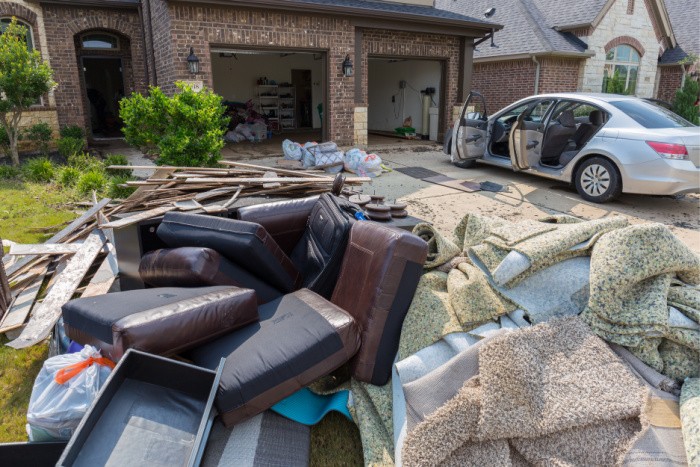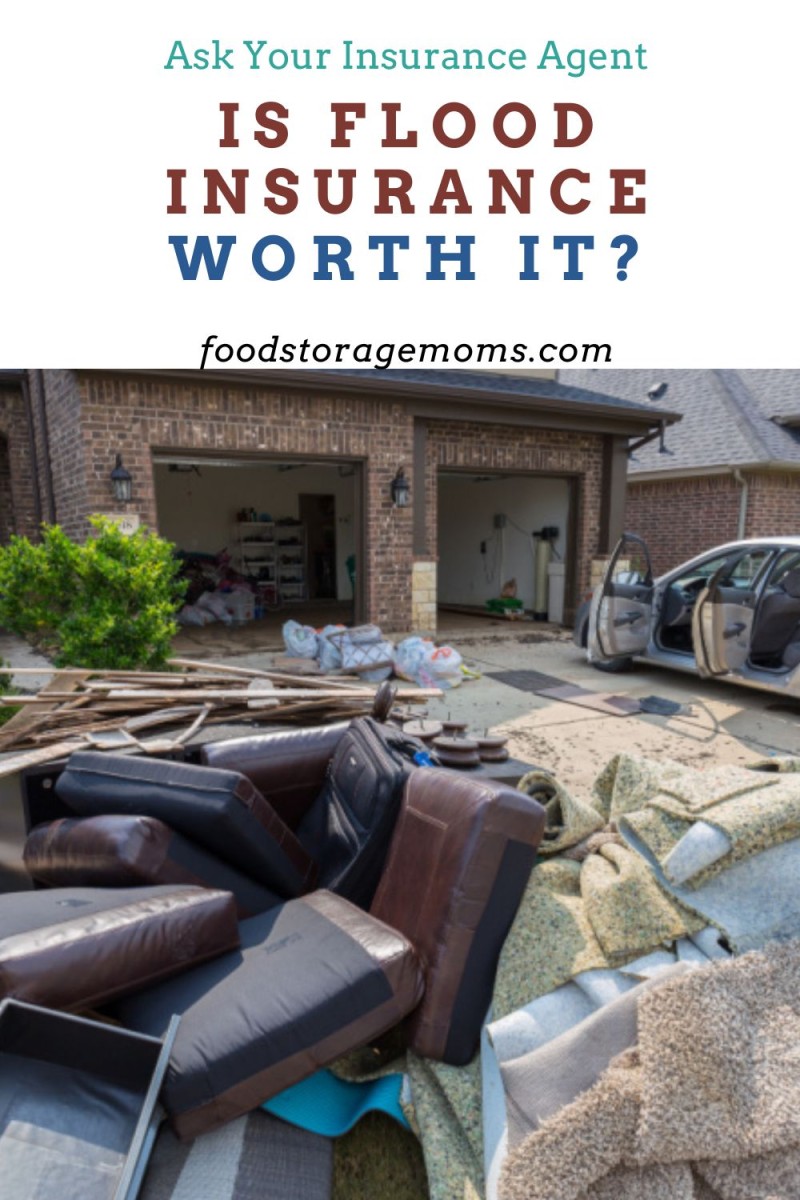
Is flood insurance worth it? Do you realize that your homeowner’s insurance doesn’t cover flood damage? Most of you probably realize that flood insurance is extra coverage, but may feel as though you simply can’t afford it and have chosen to take that risk on your own. But that decision could wind up being a huge mistake on your part because there’s always the slight chance that flooding could one day happen to you and your home. You could be left with major damage and no way to pay for it!
You might be thinking to yourself, “Well, I don’t happen to live in an area that’s particularly known for flooding.” Doesn’t that mean that I’m safe and off the hook? Actually, no, and in a minute I’ll tell you why. Is flood insurance worth it? Let’s find out, together!

Your Homeowner’s Insurance Doesn’t Cover Flood Damage
While it may seem like you’re already paying plenty out of pocket on insurance for your home, unfortunately, your homeowner’s insurance won’t do you any good if there’s been flood damage to your home due to rising water levels. Regular homeowner’s insurance is finicky about what they will cover water-wise anyways, which is why you need to read your specific insurance policy.
For instance, if a tree falls through your roof during a rainstorm and causes water damage to your floor and ceiling, you’ll be alright, but if you receive a significant amount of rain that causes a nearby water source to rise and then flood your home, you’d be out of luck. Even if you live in a high-risk area or a high-risk flood zone, you’d have to make sure you have flood insurance specifically. Usually, your mortgage company will do research to see if you live in a “flood zone” and they’ll require flood coverage if it applies to your area.
The Benefits of Having Flood Insurance
Is flood insurance worth it? Having to go through a natural disaster like a hurricane or local flooding from dams, rivers, or creeks that have broken or spilled over can be very devastating and overwhelming. You don’t have to be caught completely off guard and unprepared. A good flood insurance plan will cover the cost of any repairs, replacements, and clean-up that you may need to do after a flood.
It can even provide you with temporary living expenses if you’re forced to move out during repair or rebuild efforts. Believe it or not, most policies are decently affordable, and many have riders included that make sure you’ll be covered no matter what kind of flood damage occurs.
It’s easier to make flood claims for flood-related damage if you have flood protection! The major benefit of having flood insurance is that it covers a flood risk. Most people are shocked when a natural disaster happens to them and they discover they don’t have flood insurance coverage. Don’t be that guy! Here are some past post articles I’ve written that may give you some insights that could prove helpful:
- Hurricane Items You Must Have Before It Hits
- 5 Last-Minute Easy Hurricane Preparedness Tips
- Be Prepared for a Hurricane
- How to Prep for Hurricane Season
- Things to Stock Up On Before a Hurricane
Do I Need Flood Insurance Even if I Don’t Live in a Flood Zone?
In all honesty, flash flooding can happen anywhere and anytime, even if you don’t necessarily live in a flood zone. Even a reasonably small amount of water trickling into your home from a rainstorm can cause a lot of damage in very little time if it affects drywall, carpet, appliances, etc. That’s why flood insurance is just as important as any other kind of insurance you may have.
Even if you don’t live along the coast or near a large body of water, it’s better to be on the safe side. After all, no one wants to be stuck in a situation where they are completely unprepared with no financial support to help rebuild their home and try and put the pieces back together all on their own.
Natural disasters can happen at any point in time. It’s important to have your flood insurance cost taken care of so that all you have to worry about is making a claim. An insurance company won’t take care of you outside that exact coverage you have! It’s important to know and understand the policy you’re paying for and how it covers various scenarios that may come along
Waiting Period
Please keep in mind, there may be “waiting periods” of 2 weeks or 2 months or more before the policy will kick in and cover your home.
Is Flood Insurance Worth It?
The answer is yes, absolutely! Even if you don’t live in an area that’s at risk for flooding, it can be a wise idea to invest in flood insurance just in case. It gives you the peace of mind of knowing that no matter what Mother Nature throws your way, your home and belongings will remain safe and secure from a financial standpoint. So, take the time to understand your local area, speak with an agent and determine which policy is right for you. It could literally save you thousands of dollars down the line!
Is Flood Insurance Really Affordable?
The good news is that most flood insurance policies are surprisingly affordable. The average flood insurance today costs right around $400-$600 per year. But don’t worry, there are usually riders that allow you to increase the coverage and adjust your policy as needed for your particular situation.
Do I Need to Shop Around for Flood Insurance?
To save you a bunch of time and energy, the answer is no. That’s because every FEMA-approved insurance provider calculates their premiums based on the same rating factors. Every policy that is backed by the National Flood Insurance Program (NFIP) will have very similar coverage terms, regardless of which carrier you decide to go with.
For Those of You Who Plan on Getting Flood Insurance…
To get a better idea of how much coverage you’ll need, sit down and take inventory of your possessions along with their value, as well as estimate how much the total cost would be to repair your home. With these two figures combined, this is your potential total loss. You need to be aware that a federal flood policy will cover repairs to your home only up to $250,000.
If it’s going to cost more than that to rebuild your home, you’ll need to look into buying a private flood insurance policy that’s called “excess coverage.” Most homeowners like to purchase under the NFIP insurance plan since it is known to cover up to $100,000 of your possessions/contents.
Flood Coverage Tip
Many people don’t realize this but there are some special discounts available for those who are living in low-risk areas or have taken extra precautions to protect their homes from potential floods. One example of this is when families may have installed sandbags. It’s definitely worth inquiring with your insurance provider to see if you qualify for any discounts or lower-risk policies!
When is a good example of when you might need flood insurance?
- Hurricane season in South Carolina and Florida
- Flash floods and heavy rain
- Personal property coverage for unexpected floods (content coverage)
- Most common natural disaster(s)
- Excess flooding from snow melting faster than expected
Questions to ask yourself about flooding
- Do you live in a high-risk flood area?
- Do you live in special flood hazard areas?
- What is the average cost of flood insurance?
- Do I live within a low-risk flood zone?
- Do I know the replacement cost value of my home and the contents?
- Will I ever need to make a flood insurance claim?
- What is the average annual premium for private policies where I live?
More Disaster Prep Tips
- 12 Types of Natural Disasters
- What Happens 72 Hours After Disasters
- Natural Disaster Preparedness Tips You Need
- How to Keep Your Food Safe in the Midst of Disasters
What is a 100-Year Flood?
In case you haven’t heard the term “100-year flood” it is used to describe the recurrence interval of floods. It means the interval of recurring severe floods cover a 100-year period where it has a one percent chance of happening in any given year. In other words, the odds that a river will flow as high as the 100-year flood stage this year is 1 in 100.
This designation, and the one for the 500-year flood below, is established by the United States Geological Survey (USGS). This federal agency provides the science about natural hazards that threaten lives and livelihoods. These hazards can affect our sources of water, energy, minerals, and other natural resources we all rely on. The amount of devastation from a flood can take many forms, such as loss of life and extensive property damage to private and public property. It may include the loss of access to clean water, disrupted power, wiped out farms and livestock, and the inability to retrieve minerals, forest products, and other resources that drive the economy.
I learned that most neighborhoods’ building codes for the public infrastructure are required to control the flow of any flooding to survive a 100-year flood. I lived through one 100-year flood when I lived in Southern Utah. They have clay soil which makes things even worse since the soil doesn’t absorb the water as quickly.
What is a 500-Year Flood?
I must stress that 100-year and 500-year floods are totally different independent events. For instance, with a 500-year flood, there is a 0.2% chance of having a flood of that magnitude occurring.
When I lived in Southern Utah, we had two 500-year floods. The first one was in 2005, the year we bought our home. Santa Clara, Utah 2005 Flood and a second one Flash Floods in Southern Utah 2012
Whether it’s a 100 or 500-year flood doesn’t mean floods of that magnitude can’t happen more often. Based on historical data and how floods have affected the topography of an area, geologists have drawn scientific conclusions that are used. The challenge in recent decades has been the effects of global warming to those historical numbers and how to predict future events.
Final Word
If you live in an area where there is a risk of flooding and hurricane damage, having flood insurance can be a lifesaver when it comes to protecting your home and property from devastating losses. Before disaster strikes, make sure to do some research on the best flood insurance policies out there so you’ll have coverage in case of an emergency. It could save you more than just money. It could also save you peace of mind!
It’s always a good idea to make sure you have the proper amount of coverage. The average flood claim takes a while to settle too, so it’s important to have money put away to carry you through while you wait on your claim! Is flood insurance worth it? Let me know your thoughts. May God Bless this world, Linda
Copyright Images: Life After Devastating Floods By Michelmond
The post Is Flood Insurance Worth It? appeared first on Food Storage Moms.
